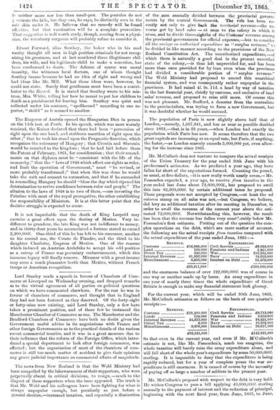The news from New Zealand is that the Weld Ministry
had been compelled by the lukewarmness of their supporters, who were perpetually absent in critical divisions, to resign, —much to the disgust of those supporters when the issue appeared. The truth is that Mr. Weld and his colleagues have been fighting for what is always unpopular enough, but peculiarly so just before a general election,—increased taxation, and especially a diminution
of the sum annually divided between the provincial govern- ments by the central Government, The rate has been re- cently not only to give heck the territorial revenue—the re- venue got by land sales at outs to the colony in which it arose, and to divide three-eighths of the Customs' revenue among the provincial governments for official expenses,—but to consider all the savings on authorized expenditure as " surplus revenue," is be divided in like manner according to the provisions of the New Zealand Constitution Act. The unauthorized expenditure,--of which there is naturally a good deal in the present unsettled state of the .colony,—is thus left unprovided for, and has been more than once provided for by loan even when the provinces had divided a considerable portion of " surplus revenue." The Weld Ministry had proposed to amend this anarchical financial system, and was consequently rather unpopular in, the provinces. It had raised 41. 9s. 11d. a. head by way of taxation in the last financial year, chiefly by customs, and exclusive of land sales' revenue, and proposed to raise still more. Of course this was not pleasant. Mr. Stafford, a deserter from the centralists to the provincialists, was trying to forrn a new Government, but it was doubtful whether he would succeed.


































 Previous page
Previous page